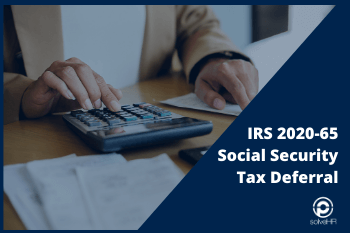- 09/03/2020
- Posted by: SolveHR-IT
- Categories: Employment Law, Payroll & Taxes

Late last week the IRS revealed more information on the payroll tax deferral executive order that President Trump signed on August 8th. The original executive order was vague but allowed for the deferral of payroll taxes for the period of September 1, 2020, through December 31, 2020. It was however stated by the Treasury Secretary that the payroll tax deferral is optional to the employer.
The deferral applies to payments of taxable wages paid to an employee that is less than $4,000 during a bi-weekly pay period, with each pay period considered separately. No deferral is available for any payment to an employee of taxable wages of $4,000 or above for a bi-weekly pay period.
This executive order only allows the President to defer collecting tax yet does not allow for forgiveness. Therefore, it was outlined by the IRS that an employer does not need to make a deposit to the feds during the deferral period but must begin making payments of any deferred taxes starting January 1, 2021, and ending on April 30, 2021. So, any deferred taxes must be paid in full during this period next year.
For example, a hypothetical employer runs payroll biweekly with the first payday after September 1 being September 7. This employer would then defer 9 payroll periods in 2020, but would then recoup what they owe to fed over 8 payroll periods in 2021 (from January 1st to April 30th). An employer that makes $1,000 per pay period would then be taking home an extra $62 per pay period in 2020, but would then be making $69.75 less in 2021 to recoup the deferred taxes.
The notice also defined the affected taxpayer not as employees, but employers. This means that employers are on the hook for any deferred tax payments and must collect anything that is owed to the fed from employees. The IRS didn’t outline what an employer must do if an employee leaves the company or doesn’t make enough to ratably pay back the tax. Employers should then carefully weigh the risks of an employee terminating their employment before the deferred taxes are collected.
The IRS should release more information in the coming weeks on the payroll tax deferral so keep checking back on IRS.gov for updates. With this being an optional program, the risks should be weighed on what is best for your company.
Subscribe to receive all our blogs
Written by: Matthew Muriel
Meet Matthew! Matthew is our content writer and has been working with us for a year. He enjoys working for SolveHR because it allows him to practice his copywriting and allows him to build experience in his fledgling career. Matthew studied at the University of Texas at San Antonio and earned his degree in English with a concentration in Professional Writing. He values learning new processes in the HR industry and then conveying those ideas to the company’s clients. When he isn’t working, he enjoys reading nonfiction, with his favorite book that he recently read being The Gene by Siddhartha Mukherjee. If he could go anywhere in the world he would travel across the United States and visit all of the national parks.

